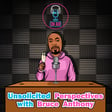
Gangs, Prison Guards & Lies: With Dr. Brittany Friedman
Author, Sociologist and USC associate professor Dr. Brittany Friedman joins Unsolicited Perspectives to dismantle America’s prison-industrial complex in this explosive episode. Author of “Carceral Apartheid: How Lies and White Supremacists Run Our Prisons”, Dr. Friedman uncovers how prisons weaponize racism, from guards orchestrating gladiator fights to hidden memos proving systemic dehumanization. Learn how white supremacist groups like the Aryan Brotherhood gained power with state backing, why gangs like the Mexican Mafia became tools of division, and how incarcerated Black activists risked everything to resist. Dr. Friedman shares chilling firsthand accounts, including a former neo-Nazi’s awakening, and reveals how prisons profit from trauma.
Prison reform, racial injustice, systemic racism, carceral apartheid, and prison gangs—this episode leaves no stone unturned. This episode not only highlights the grim realities of carceral apartheid but also ignites a call for transformative change and social justice. Whether you're an activist, a scholar, or simply someone who cares about dismantling systemic oppression, this powerful dialogue will empower you to question the status quo and join the fight for a fairer future. #prisonreform #socialjustice #SystemicRacism #JusticeForAll #breakthecycle #podcast #unsolicitedperspectives
🔔 Hit that subscribe and notification button for weekly content that bridges the past to the future with passion and perspective. Thumbs up if we’re hitting the right notes! Let’s get the conversation rolling—drop a comment and let’s chat about today’s topics.
For the real deal, uncensored and all, swing by our Patreon at patreon.com/unsolicitedperspectives for exclusive episodes and more.
Thank you for tuning into Unsolicited Perspectives with Bruce Anthony. Let's continue the conversation in the comments and remember, stay engaged, stay informed, and always keep an open mind. See you in the next episode!
🌐 Website: Dr. Brittany Friedman Official Website (https://brittanyfriedman.com/)
📧 Email: Reach out to Dr. Brittany Friedman at brittany.friedman@usc.edu
📸 Instagram: (https://www.instagram.com/curlyprofessor/)
📚 Amazon: "Carceral Apartheid: How Lies and White Supremacists Run Our Prisons"
Chapters:
00:00 Welcome to Unsolicited Perspectives 🎙️🔥💥
00:49 Meet the Truth-Teller: Dr. Brittany Friedman 🗣️🔥
01:58 From Skeptic to Scholar: Dr. Brittany’s Path to Truth 🌟🔍
06:01 The Genesis of Prison Gangs: Power, Politics, and Survival 🕵️♂️⚔️
12:50 We Don’t Want Martyrs”: The State’s Blueprint for Silence 🏛️🌀
21:41 Gladiator Fights: The Grim Spectacle of Racial Division 🥊⚠️
32:52 Echoes of History: What the Past Reveals About Today’s Prisons 📜🔗
41:47 Chicago’s Unseen War: Prisons, Gangs, and the Irish Mob’s Hidden Role 🏙️🔥
43:02 I Heard His Cries at Night”: A Neo-Nazi’s Awakening ✊🕊️
46:02 Guards as Puppet Masters: Manufacturing Racial Enemies🚨⚖️
49:09 From Cells to Solidarity: When “Enemies” Become Allies ❤️🔄
54:25 Can Hate Be Unlearned? The Battle for Minds Behind Bars 🔄🌍
59:20 Reimagining Justice: The Blueprint for a Fairer System 🛠️🌈
01:03:46 Life Beyond Bars: Alternatives to a Broken System 🚪✨
01:06:09 Hope is Resistance: Fighting Back with Joy and Evidence 🌟❤️
01:09:41 Your Turn: Will You Stay Silent or Speak Up? 🖋️🌟
Follow the Audio Podcast:
Apple Podcast: https://podcasts.apple.com/us/podcast/unsolicited-perspectives/id1653664166?mt=2&ls=1
Spotify: https://open.spotify.com/show/32BCYx7YltZYsW9gTe9dtd
www.unsolictedperspectives.com
Beat Provided By https://freebeats.io
Produced By White Hot
